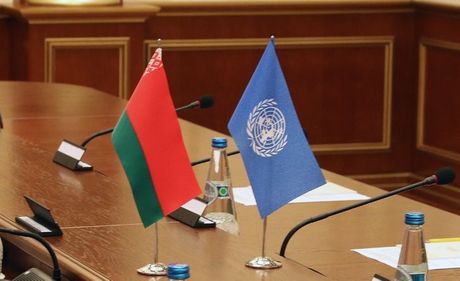Kravchenko: Belarus-USA rapprochement is not meant against Russia
14:13, 5 March

It is wrong to think that closer ties between Belarus and the United States of America are detrimental to Belarus' relations with Russia, Belarus' Deputy Minister of Foreign Affairs Oleg Kravchenko said at a seminar on priorities of international parliamentary cooperation for Belarus in the emerging multi-polar world.
- Share on Facebook
- Share on VK
- Share on Twitter
“Statements alleging that Belarus and the USA are expanding contacts at the expense or to the detriment of relations with Russia are wrong, senseless and unacceptable to us. Our relations with Russia are comprehensive, multi-level and beneficial for us. I absolutely reject setting rapprochement with the USA against strategic, allied relations with Russia. The relations [with the USA] are not meant and cannot be meant to harm Russia. First of all, we do not have any plans like this. Secondly, Americans do not force or even ask us to turn our back on Russia. All of us have heard the statement of the Russian representative who said that Belarus has a sovereign right to build relations with the USA,” Oleg Kravchenko said.
In his words, Belarus can set an example for other countries of the region. “We believe that it is Belarus that can become a success story in promoting a non-conflict win-win relations with Russia and the West. Belarus will show everyone that it is absolutely possible to build relations that can boost regional security, instead of driving a wedge between countries. In the future this will encourage two biggest regional trading unions – the EAEU and the EU - to come closer. We hope that some day we will be able to resume the work to establish a common economic space from Lisbon to Vladivostok. However, at the moment we are closely following Russia-USA contacts at various levels. We are interested in rapprochement between these countries as they play an important role in international security. We stand ready to offer all kinds of assistance for this very important dialogue, if needed,” Oleg Kravchenko said.
He emphasized that the U.S. official statements reaffirming the U.S. support for Belarus' independence and sovereignty, just like other aspects of bilateral relations that were redefined, should not be viewed through the prism of geopolitical confrontation. “Sovereignty, as a cornerstone of statehood, has a special place in the political discourse with the USA. Sovereignty is an unwavering value for Belarus, too. This approach also makes economic sense. The work on the very demanding American market became one of the keys to success for the IT sector of Belarus. The export of services to the USA grows year to year. Is not it in the best interests of Belarus? Don't our interests coincide with American interests? Is there anything about it that hurts Russia? This is just one example, but such examples are many,” the deputy minister said.
Oleg Kravchenko noted that the USA and the EU member states pursue a similar, though not the same policy towards Belarus. “Not because someone holds away over someone or coerces someone to do something, but because they are like-minded nations whose societies and elites evolved in the same way throughout history. At some point our relations with the USA are ahead of our relations with the EU, at other points our contacts with Europe are in the lead, however this is a rather subjective feeling, because it is difficult to determine universal criteria. Indeed, there are certain disagreements between the U.S. Administration and some European governments, in particular, when it comes to trade. However, I am sure that the progress made in our relations with the USA will not affect our contacts with Europe,” he emphasized.
Oleg Kravchenko added that Belarus and the USA are mending their ties step by step. “I disagree with those who think that Belarus-USA rapprochement is due to the developments in Ukraine or the deterioration of the relations between the USA and Russia. The rapprochement started back in 2012, partially in 2011 and it proceeded slowly and cautiously. It is attributed to the political will and efforts of both parties. The current state of relations is a result of consistent and continuous work and efforts to come to terms across the matters where we disagree. It did not come out of the blue or due to reasons beyond our control,” the deputy minister noted.






